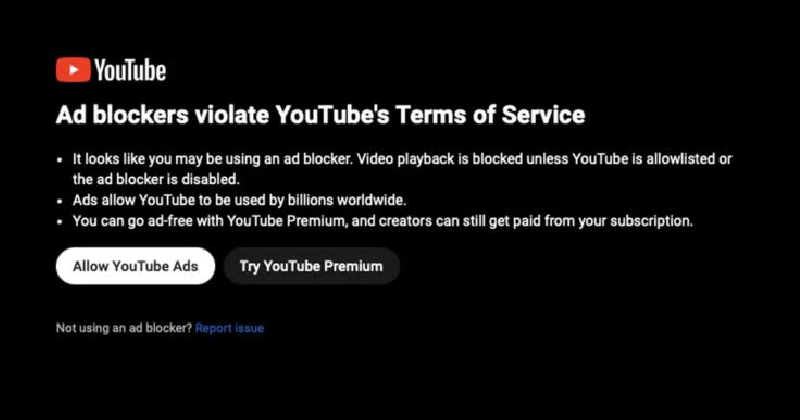YouTube has expanded its global campaign against ad-blocking extensions, extending a preliminary experiment initiated in June.
As highlighted by Android Authority on Monday, certain YouTube users are currently encountering a disruptive message when attempting to view videos while using a browser equipped with an ad blocker. This message underscores that "ad blockers violate YouTube's Terms of Service" and encourages users to either enable ads on YouTube or opt for a YouTube Premium subscription.
Although I could still watch YouTube with an ad blocker, an increasing number of users have recently reported encountering this message. According to The Verge, some individuals who encounter the message can still watch videos, but "for one Verge staff member, YouTube now consistently blocks them."

Google has officially confirmed its intensified efforts against ad-blocking on YouTube in a statement shared with The Verge and various other media outlets. The statement emphasizes that the use of ad blockers violates YouTube's Terms of Service and discloses their global initiative to encourage viewers with ad blockers enabled to either allow ads on YouTube or explore an ad-free experience through YouTube Premium. They stress the significance of ads in supporting a diverse community of content creators and making content accessible to billions of users worldwide.
The link provided on Google's support page, mentioned in the statement, warns that continued use of ad blockers may result in the blocking of video playback. YouTube's terms of service explicitly prohibit users from "modifying" the service or attempting to circumvent, disable, engage fraudulently with, or interfere with any aspect of the Service. This includes security-related features and features that prevent or restrict the copying or use of content or limit the use of the Service or Content.
In June, Google initially disclosed to The Verge that they were conducting a "small experiment globally" to encourage users with ad blockers to enable ads on YouTube or consider YouTube Premium. It now appears that this initiative has been expanded.
Since the initial announcement of the "experiment," ad blockers like Adblock Plus have been exploring ways to continue serving YouTube users. However, Google's efforts to block ad-blockers are becoming more stringent, making it increasingly challenging for such services to function. Users have expressed their dissatisfaction with YouTube's heightened crackdown on ad-blockers on social media. Criticisms include the excessive number of ads, including offensive and intrusive ones, a general aversion to ads, and the observation that even YouTube Premium subscribers still encounter videos with sections dedicated to video creators' sponsors.
Despite user backlash, Google remains committed to preserving its primary revenue source, which is advertising. Consequently, users can anticipate encountering 30-second unskippable ads when watching YouTube on TV, and the company has even experimented with making the "skip ads" button less prominent.
Google is optimistic that users who prefer an ad-free experience will opt for YouTube Premium, which saw a price increase in July. Their strategies include requiring a subscription to watch 4K videos and increasing the frequency of unskippable ads to encourage users to consider the premium service.